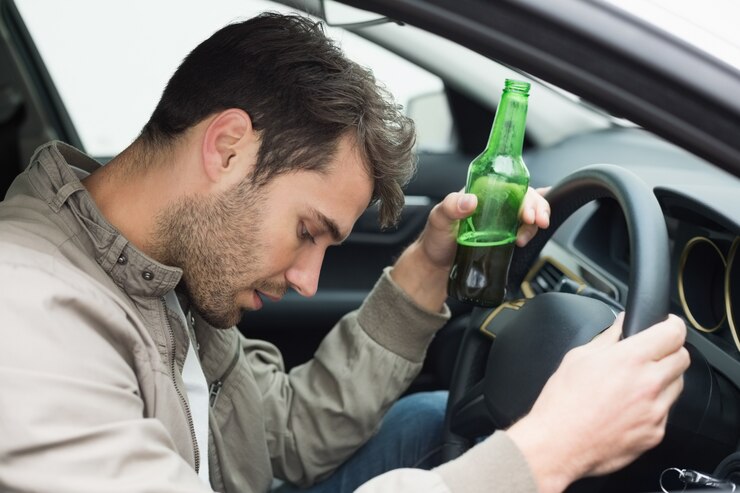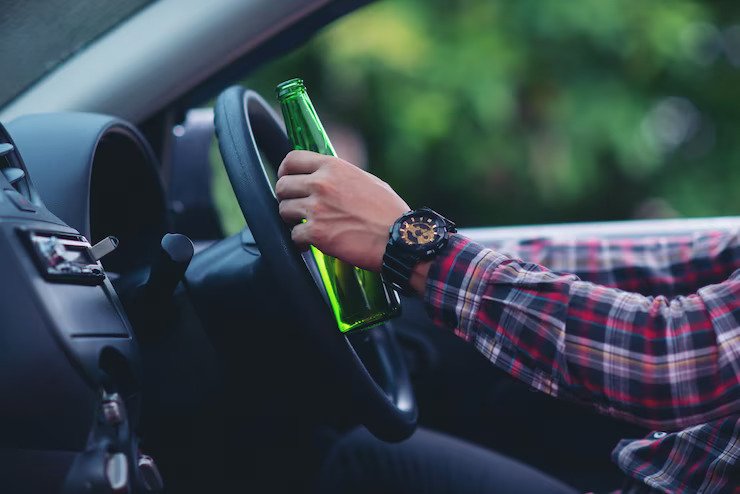The allure of the open road and the freedom of driving can be incredibly intoxicating. However, when alcohol enters the equation, the once exhilarating experience can quickly turn into a dangerous and potentially deadly affair.
The impact of alcohol on driving performance and decision-making is a topic of great concern, as it affects not only the driver but also innocent lives on the road. So, it’s best to get more information in this context so that you can be careful and responsible in the future.
The Impact Of Alcohol On Your Driving Performance

Alcohol, as it has been vilified by physicians, is pernicious for both your psychological as well as your physical health. In this section, we have tried to cover most of them.
So, let’s keep an eye on them.
A: The Psychological Ramifications of Alcohol
According to a source, alcohol abuse can have a highly-negative impact on our psychological or mental health. For example, drinking for a prolonged period can lead to chronic depression and severe anxiety in high-risk people. Besides, it may also –
1: Affect Your Central Nervous System
Alcohol is a central nervous system depressant, which means it slows down the functioning of your brain and spinal cord. When you consume alcohol, it will affect various parts of your nervous system, leading to several physiological and behavioral changes.
Here are some ways alcohol affects your nervous system –
Excessive alcohol consumption can impair your ability to form new memories and retrieve existing ones. So, you may become forgetful after drinking.
It also direly affects the cerebellum, which is responsible for coordinating movement and balance. That’s why you feel dizzy most of the time after drinking alcohol.
Drinking too much alcohol can also be detrimental to the autonomic nervous system, which controls involuntary bodily functions such as heart rate and blood pressure.
2: Cause Cognitive Impairment
Alcohol affects the brain’s ability to make rational decisions and exercise good judgment. It slows down cognitive processes, leading to poor reasoning, decreased inhibitions, and a false sense of confidence. Vision is also adversely affected, making it difficult to judge distances and perceive obstacles accurately.
This, in turn, makes it difficult for a driver to see what’s coming in front of them and leads to a life-threatening accident.
In fact, almost 37 people in the USA lost their lives due to alcohol-related mishaps. And most of these cases usually arise due to consumption impairing their cognitive functions.
B: Negative Impact on Driving Performance
Alcohol, as mentioned before, can also negatively impact your driving performance too. Here is what you need to know about it –
1: Reaction Time and Coordination
Alcohol significantly compromises reaction time and coordination, essential skills for safe driving. Impaired reaction time increases the likelihood of accidents as the brain processes information more slowly, delaying responses to hazards on the road.
Hand-eye coordination and muscle control are also impaired, affecting the ability to steer, brake, or accelerate properly.
2: Attention and Concentration
Driving requires sustained attention and concentration. Alcohol diminishes these abilities, leading to decreased vigilance while driving. Drivers may fail to notice important traffic signs, signals, and changes in road conditions.
Dividing attention between multiple tasks, such as monitoring the road while conversing or adjusting the radio, becomes challenging under the influence of alcohol.
C: BAC (Blood Alcohol Concentration) and Health Deterioration
Understanding the correlation between BAC levels and impairment is crucial. At low BAC levels of 0.02% to 0.05%, individuals may experience slight euphoria, relaxation, and a decline in visual functions. As the BAC rises from 0.05% to 0.08%, the judgment, coordination, and concentration of an individual begin to worsen.
Muscle control is reduced, perception is impaired, and accurately tracking moving objects becomes more difficult.
As the BAC exceeds legal limits, usually 0.08% in many jurisdictions, the impairment becomes more severe. Furthermore, reflexes tend to slow down, decision-making abilities are significantly compromised, and maintaining a steady speed or staying within the proper lane becomes challenging. This, in turn, can lead to accidents of all sorts.
Consequences Of Drunk Driving
Alcohol-impaired driving is dangerous both for your or someone else’s life and your legal or legislative side of things. In this section, we have shared some of the consequences of driving while being drunk. So, be sure to keep a close eye on the same –
Most states in the USA tend to suspend driver’s licenses for drunk driving. If that’s the case, then you will need to hire a Las Vegas DUI Defense Lawyer to get assistance with it. They will listen to your case and ensure that you are not being incarcerated for the wrong reason. So, ensure that you are being truthful to them.
If your state has a higher level of penalty orientation, it might also sentence you to mandatory jail time. And it’s applicable even if this is the first time you’ve committed an offense. Besides this, you may have to pay a decent amount of fines and fees too.
In some cases, the court may also ask you to install a technology called IID (ignition interlock device) on your vehicle. It’ll detect if you have consumed alcohol and stop you from driving or operating the car.
How Do You Prevent The Circumstances Of Drunk Driving?

The answer to this question is pretty simple – just stop drinking, especially if you have a plan to go out or something.
1: Planning Ahead and Designating a Sober Driver
Responsible decision-making is crucial to prevent alcohol-related accidents. Planning ahead by designating a sober driver before consuming alcohol can ensure a safe journey for everyone involved. This approach eliminates the risk of impaired driving and you getting into an unfortunate accident.
2: Alternative Transportation Options
Utilizing alternative transportation options, such as taxis, rideshare services, or public transportation, can provide a safe and responsible means of travel when alcohol consumption is involved. These options help avoid the temptation to drive under the influence and promote road safety.
3: Education and Awareness Campaigns
Education and awareness campaigns play a significant role in promoting responsible drinking and discouraging impaired driving. By raising awareness about the dangers and consequences of alcohol-impaired driving, society can cultivate a collective understanding that alcohol and driving do not mix. Such campaigns can emphasize the potential severity of accidents caused by alcohol and encourage individuals to make responsible decisions.
FAQs – Frequently Asked Questions
Q: What Is The Legal Blood Alcohol Concentration (Bac) Limit For Driving In Most Countries?
A: The legal BAC limit varies between countries, but it typically falls within the range of 0.05% to 0.08%. In some countries, there are stricter limits for novice or commercial drivers. Keep in mind that even small amounts of alcohol can affect your driving abilities, so it is best to avoid alcohol entirely if you plan to drive.
Q: Can Even A Small Amount Of Alcohol Affect Driving Performance?
A: Yes, even a small amount of alcohol can impair driving performance. It is a common misconception that only large amounts of alcohol have an impact. Even at low levels, alcohol affects cognitive and motor functions, which can compromise driving skills and increase the risk of accidents.
Q: Are There Any Factors That Influence How Alcohol Affects Individuals Differently?
A: Yes, several factors influence how alcohol affects individuals differently. These include body weight, metabolism, tolerance to alcohol, overall health, medication use, and the presence of food in the stomach. Additionally, factors such as age, gender, and genetic predisposition can also impact how alcohol is processed and its effects on driving performance.
Q: What Are Some Signs That A Driver May Be Under The Influence Of Alcohol?
A: Signs that a driver may be under the influence of alcohol include erratic or aggressive driving behavior, swerving or drifting between lanes, excessive speeding or slowing down, abrupt braking or accelerating, delayed reactions to traffic signals, driving without headlights at night, and inconsistent use of turn signals. Additionally, slurred speech, bloodshot eyes, the odor of alcohol, and impaired motor skills may also be observable if interacting with the driver directly.
Q: List The Legal Consequences Of Driving Under The Influence Of Alcohol?
A: The legal consequences for driving under the influence of alcohol vary by jurisdiction, but they generally involve penalties such as license suspension, fines, revocation, compulsory alcohol education and or treatment programs, probation, community solutions, and even imprisonment. Repeated offenses or cases involving serious injury or death due to drunk driving can result in more severe penalties.
The Bottom Line
Intoxicating roads, fueled by the presence of alcohol, pose a significant threat to road safety.
By understanding the physiological effects of alcohol, recognizing its impact on driving performance at different BAC levels, and prioritizing responsible decision-making, we can work together to reduce the incidence of alcohol-related accidents.
It is essential to remember that reaching our destination safely is the ultimate goal, not just for ourselves but also for the well-being of others sharing the road.
Read Also:




























